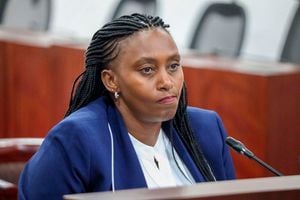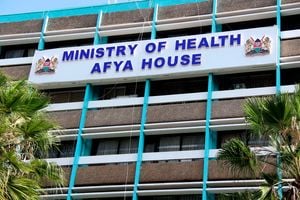
President William Ruto (center) arrives for the official opening of the Kilifi International Investment Conference at Vipingo in Kilifi County on November 5, 2024.
President William Ruto has maintained that counties were not forced to sign onto a multibillion-shilling medical equipment deal, as the identity of seven companies contracted for the supplies remains a close-guarded secret between State House, the Health ministry and a few county government representatives.
The medical equipment supply project has mimicked the biblical tower of Babel, as conflicting voices from both levels of government continue to throw confusion into fine details that would allow public scrutiny of deals counties will be tied to for at least seven years.
Speaking at the Kilifi County International Investment Conference on Thursday, Dr Ruto said sourcing of vendors to supply medical equipment to county-owned health facilities was done in line with procurement laws and with the input of the Council of Governors.
Under the National Equipment Service Project (NESP), the dealers will supply an assortment of machines and equipment to county-owned facilities, and will be paid directly from Social Health Authority (SHA).
“(Kilifi governor Gideon) Mung’aro is here, (Mombasa governor Nassir) Abdulswamad is here, (Kwale governor Achani) Fatuma is here. They are governors. There is nobody who forced them to sign any contract. That is the truth. Nobody was forced. You have to be a fool to be forced to sign the wrong thing and you actually sign,” the President said.
Mombasa is among the counties that are yet to sign agreements with the Ministry of Health for the supply of the medical equipment.
Mombasa governor Nassir on Wednesday said that his county is still evaluating the document, but that Mombasa is exploring other options to equip its health facilities.
President Ruto held that there are seven vendors contracted for the project, and that he will guard it against corruption. He did not list the names of the vendors.
Earlier, Health Cabinet Secretary Deborah Mlongo Barasa and Council of Governors chairperson Ahmed Abdullahi released a joint statement stating “a transparent tendering process” had led to the award of contracts to “seven qualified bidders in October 2024.”
But the statement did not reveal the names of the seven bidders and the two did not provide their names despite subsequent inquiries by Nation.
We asked Ms Mlongo for the names of the seven vendors, which procurement method the ministry used, and the contradictions in the statement and the COG’s submissions to Senate.
Ms Mlongo referred us to Medical Services Principal Secretary Harry Kimtai, whose known mobile phone number was still switched off at the time of going to press.
Neither Mr Kimtai nor the Ministry of Health communications responded to an email sent to their official addresses on Thursday.
In their statement, Ms Barasa and Mr Abdullahi explained the seven companies were in October contracted to supply the medical equipment through a Fixed-Fee-for-Service (FFS) model.
They said the tender was advertised in June, 2024 and evaluation of bidders concluded in October, with seven companies being awarded contracts.
“To operationalise the FFS model, a transparent tendering process was undertaken informed by the Public Procurement and Asset Disposal Act. Public advertisements were made in MyGov bulletin, the Ministry of Health website and the Public Procurement Information Portal in June, 2024,” the statement read in part.
But when the Nation checked all four editions of MyGov published between June 4 and June 25, 2024, there were no advertisement of the tender.
On the Health ministry website, there were only advertisements for recent tenders. This means the ministry may have pulled down the advertisements if they had been placed on the website.
On the Public Procurement Information Portal, there were no postings of contracts awarded under the NESP.
Mr Abdullahi said that the procurement was done through open tendering, but he refused to divulge the names of the seven bidders, insisting that the information is “publicly available”, despite there being no mention of the deals or vendors in any public procurement platform.
The Health ministry in June, 2023 got approval to use the Specially Permitted Procurement Procedure (SPPP) – the same method that was used to contract the Safaricom consortium for a Sh104.8 billion health system, and Adani Energy for a Sh96 billion electricity transmission lines deal.
The President has since announced the cancellation of the Adani deal with Ketracco after damning US indictments of officials of the Indian conglomerate on bribery charges.
Mr Abdullahi insisted that the procurement was done through open tendering but did not go into details of why the SPPP model was explored and why open tendering was settled on.
On Wednesday, representatives of the Council of Governors told the Senate’s Public Accounts Committee that counties were in the dark on the nitty gritty of the supply deals, and only signed agreements with the Health ministry under duress.
Nyeri governor Mutahi Kahiga, under oath, told senators that the Health ministry has been calling the shots on the big money deals, and that counties signed on because they had no other option.
Mr Kahiga appeared before the Senate’s Public Accounts Committee on Wednesday in his capacity as Council of Governors vice-chairperson.
In his submissions, Mr Kahiga said that the deals were not the best, but that counties had no option but to sign onto the programme.
“I am saying this as the Council’s vice-chairperson. Having looked at the circumstances and where we were, I don’t want to say this is the best. I am not even sure it will work, this was a desperate move. We were caught in a situation where we know the food is bad and might harm you a little bit but it is better that you eat it,” Mr Kahiga told senators.
The lawmakers warned that contracts that counties and the Health ministry have signed under the National Equipment Service Programme – an initiative intended to supply assorted medical equipment in county-owned health facilities – are illegal.
Just hours after Mr Kahiga’s remarks and the Senate’s warning, Mr Abdullahi, the COG chairperson, and the Health CS released the joint statement defending the deals as above board.
They argued the FFS model relieves county-owned health facilities of upfront costs paid to suppliers.
“The FFS model allows vendors to supply, maintain and upgrade state-of-the-art equipment at no upfront county health facilities, enabling counties to focus resources to patient care,” Mr Barasa and Mr Abdullahi said in their statement.
The FFS model will see majority of fees paid for services by patients directed to settling the suppliers’ dues.
In most cases, the vendor will get between 60 per cent and 80 per cent of the funds released by the Social Health Authority for treatment of patients.
For instance, a patient seeking hemodialysis is covered by SHA up to Sh10,560. After treatment, SHA will send Sh8,660 or 82 per cent of the service cost directly to the equipment supplier, with the hospital retaining only Sh1,990 or 18 per cent.
Repairing a Posterior Cruciate Ligament (PCL) or Anterior Crucial Ligament (ACL) injury, common in accidents and sports, will be covered by SHA up to Sh280,000.
The vendor will get Sh345,709 – more than the SHA cover. Still, the document shows that the hospital will receive Sh65,709.
Patients seeking Bentall’s procedure – replacing the aortic valve, root and ascending aorta with a graft – SHA will cover them up to Sh1,008,000. But the vendor will receive Sh760,480 or 75 per cent, as the hospital retains Sh247,520 or 25 per cent of the service fee levied to the patient.
Ms Barasa and Mr Abdullahi, in the statement, said governors were involved in all processes, including procurement of vendors.
The statement contradicted what Mr Abdullahi’s deputy, Mr Kahiga, told senators on Wednesday.
On Thursday, Mr Kahiga insisted that what he told the Senate stands.
“Were governors involved in the advertising and procurement of the vendors and suppliers of the medical equipment? The answer is NO. Were individual counties involved in the above? NO, THEY WERE NOT! The only team involved was the COG technical team that sat with the MOH,” Mr Kahiga said in a text message to Nation.
Mr Abdullahi said that the technical team represented the views and interests of all 47 counties, and that it reviewed the deal with vendors.
The COG chair added that no county will be forced to sign onto the NESP.
“If there are counties that have enough money to fund their own equipment without any need for being assisted by these vendors, then they are free not to sign it. But I signed mine and NESP is the way to go,” Mr Abdullahi said.












